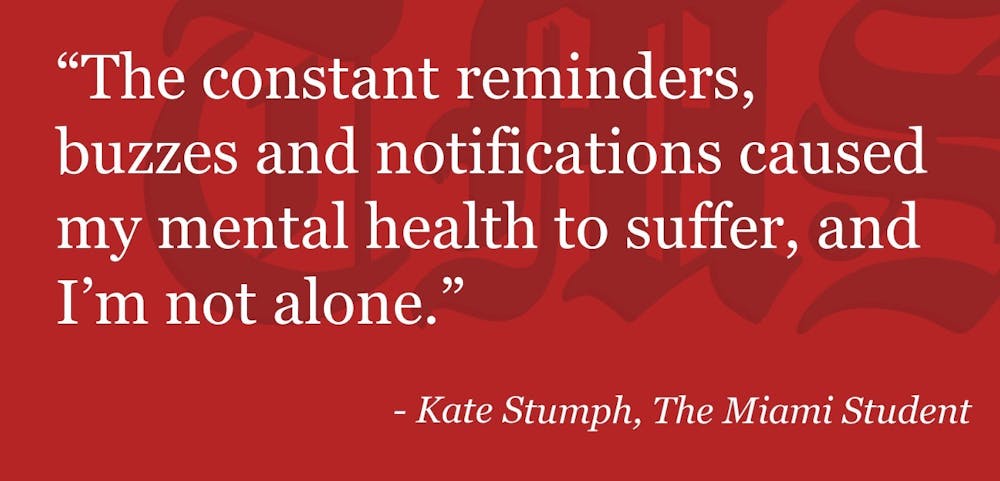It’s 10 p.m. on a Saturday night, and you’re spending time with roommates, friends or family (while socially distancing of course), and all of a sudden, you feel your phone buzz in your pocket.
Hoping it’s a cute snapchat or text, you check your phone, and instead of the fun message you were expecting, you see it — the dreaded Canvas symbol: a notification reminding you about an upcoming assignment or post.
If you’re anything like me, you feel a freezing wave of panic as you scramble through your Canvas dashboard and to-do list to make sure you didn’t miss a deadline.
When Miami went online last March, I found myself constantly bombarded with hundreds of Canvas notifications and discussion boards. Though I understand that these are necessary to student learning and can be helpful, it made it difficult for me to separate school from my personal life. I felt consumed by school work and assignments because my bedroom became my classroom.
Faculty literacy with Canvas and other programs also became a problem. I was taking six classes with six different professors, and each had their own particularities for announcing, submitting and discussing assignments. While some professors preferred to have students collaborate and post their work to a communal discussion board, others preferred assignments emailed to them, and some wanted them uploaded through Google Drive.
I’ve always considered myself to be an organized, responsible person, yet I felt increasingly anxious about school and missing deadlines. Instead of focusing on a workout or TV show, I would be online, checking my email and crossing things off my to-do list.
The constant reminders, buzzes and notifications caused my mental health to suffer, and I’m not alone.
The COVID-19 pandemic has thrown our society for a loop, and universities in particular struggle to balance a budget with student safety. Guidelines that began as temporary measures have now become our reality for the foreseeable future, and online school is no exception. The benefits and drawbacks of learning online are still being tested by college student guinea pigs everywhere.
And while I and most other students recognize that staying home is necessary to both public and personal safety, many of us feel the negative and often overlooked mental side effects of online, asynchronous learning.
Aspects of online school inherently lend themselves to certain problems. For example, students may struggle with the isolation of online school, while others find greater difficulty in making time for school work and following a set routine, resulting in poor academic performance.
Since the advent of online school, 32% of students say that their mental health concerns have worsened, and schools and behavioral health centers alike struggle to keep up with the increased demand for mental health services and professionals.
Anxiety consistently tops the list of mental disorders suffered by college students, followed closely by depression. A study conducted by Penn State found that 60% of college students report anxiety as a major health concern, and female students are particularly at risk.
Enjoy what you're reading?
Signup for our newsletter
While stress is normal and expected in college, anxiety and depression are not, and both can lead to physical symptoms including high blood pressure, weight gain and loss, irritability and substance abuse.
I do acknowledge that there are multiple undisputed benefits to online learning. For example, students with disabilities and certain illnesses are able to attend and follow their classes without worrying about missed material and due dates. Additionally, many students feel they have more time for assignments and can follow their classes at their own pace. Students that struggle with social anxiety can tune into class with ease, and they can participate on discussion boards with minimal worry.
I, like many of us, am anxious about online classes. They present a new and unfamiliar territory, and as the number COVID-19 cases increases, I think it’s safe to say that this is a reality we have to accept.
Miami has multiple resources to combat students’ increased mental health concerns including the Rinella Learning Center, Student Counseling Services and the Psychology clinic, all of which are offering certain remote services.
These are unprecedented times, and it’s more important now than ever to take care of yourself and be conscious of your own needs.
So, mute those notifications on the weekends and try to focus on yourself — you’ll be happy you did.




